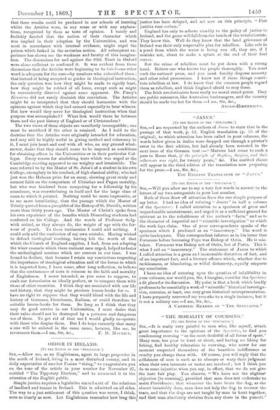ORDER IN IRELAND.
(TO THE EDITOR OF THE "SPECTATOR.') SIR,—Allow me, as an Englishman, agent to large properties in the south of Ireland, living in a most disturbed county, and in daily expectation of another Fenian "rising," to congratulate you on the tone of the article in your number for November 27, entitled "The Tipperary Election," and to commend it to the attention of the English public.
Simple justice requires a legislative amendment of the relations of landlord and tenant in Ireland. This is admitted on all sides. The way to a just settlement of this question was never, I think, seen so clearly as now. Let Englishmen remember how long this justice has been delayed, and act now on this principle, "Fiat justitia mat ccelum." England has only to adhere steadily to the policy of justice to Ireland, and the game will fall from the hands of the revolutionists. They know this. Well do they know that the land grievance of Ireland was their only respectable plea for rebellion. Like eels in a pond from which the water is being run off, they are, if I mistake not, about to make a splash at the end of their foul career.
But the crime of rebellion must be put down with a strong hand. Believe one who knows the people thoroughly. You must curb the national press, and you must forciby disperse amnesty and other rebel processions. I know not if these things consti- tute rebellion at law. I do know that the common people regard, them as rebellion, and think England afraid to stop them.
The Irish revolutionists have really no moral stand-point. They are public nuisances, like Australian bushrangers, and the country should be made too hot for them.—I am, Sir, &c.,
ANGLO-IIIBERNICCS.






































 Previous page
Previous page